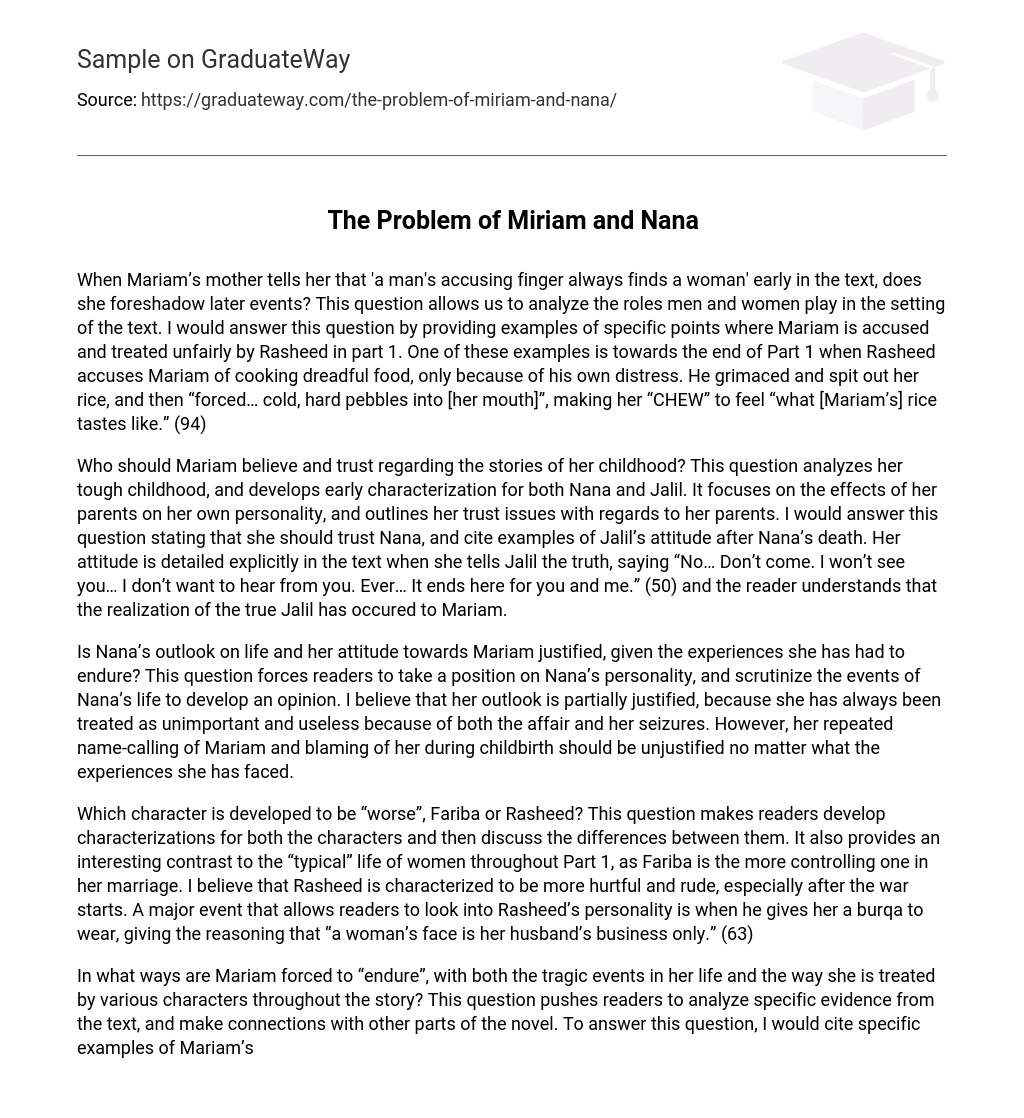When Mariam’s mother tells her that ‘a man’s accusing finger always finds a woman’ early in the text, does she foreshadow later events? This question allows us to analyze the roles men and women play in the setting of the text. I would answer this question by providing examples of specific points where Mariam is accused and treated unfairly by Rasheed in part 1. One of these examples is towards the end of Part 1 when Rasheed accuses Mariam of cooking dreadful food, only because of his own distress. He grimaced and spit out her rice, and then “forced… cold, hard pebbles into [her mouth]”, making her “CHEW” to feel “what [Mariam’s] rice tastes like.” (94)
Who should Mariam believe and trust regarding the stories of her childhood? This question analyzes her tough childhood, and develops early characterization for both Nana and Jalil. It focuses on the effects of her parents on her own personality, and outlines her trust issues with regards to her parents. I would answer this question stating that she should trust Nana, and cite examples of Jalil’s attitude after Nana’s death. Her attitude is detailed explicitly in the text when she tells Jalil the truth, saying “No… Don’t come. I won’t see you… I don’t want to hear from you. Ever… It ends here for you and me.” (50) and the reader understands that the realization of the true Jalil has occured to Mariam.
Is Nana’s outlook on life and her attitude towards Mariam justified, given the experiences she has had to endure? This question forces readers to take a position on Nana’s personality, and scrutinize the events of Nana’s life to develop an opinion. I believe that her outlook is partially justified, because she has always been treated as unimportant and useless because of both the affair and her seizures. However, her repeated name-calling of Mariam and blaming of her during childbirth should be unjustified no matter what the experiences she has faced.
Which character is developed to be “worse”, Fariba or Rasheed? This question makes readers develop characterizations for both the characters and then discuss the differences between them. It also provides an interesting contrast to the “typical” life of women throughout Part 1, as Fariba is the more controlling one in her marriage. I believe that Rasheed is characterized to be more hurtful and rude, especially after the war starts. A major event that allows readers to look into Rasheed’s personality is when he gives her a burqa to wear, giving the reasoning that “a woman’s face is her husband’s business only.” (63)
In what ways are Mariam forced to “endure”, with both the tragic events in her life and the way she is treated by various characters throughout the story? This question pushes readers to analyze specific evidence from the text, and make connections with other parts of the novel. To answer this question, I would cite specific examples of Mariam’s necessity to “endure”, such as with the multiple miscarriages, her tough childhood, and her continually tough married life. Specifically, she has had to endure the wrath of Rasheed’s personality at times, and especially the tough realization of Jalil’s true self earlier in the novel.
Why would the author portray Nana as crazy and overly pessimistic early in the story? The question forces a reader to not only analyze characterization, but relate it to the theme and open a broader perspective to society at the time the story takes place. I believe the author portrays Nana this way to actually show the extremely tough conditions for women in Afghanistan at the time. When Nana speaks bluntly about how dreadful her life was, she is speaking for almost every woman in traditional families. When Nana is depressed and pessimistic, it’s because that’s how the author feels about the dreadful situation in gender roles and that women have no choice but to be pessimistic because of what they have to go through.





